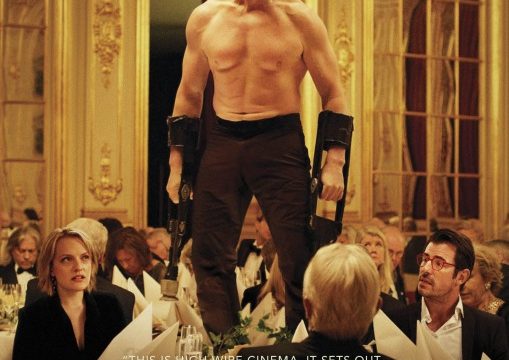The modern-day idea of art being created solely for the sake of pushing people’s buttons has taken on a negative connotation and that’s really not unwarranted. You’ve got countless animated and live-action TV shows trying to ape the bawdy humor of the likes of South Park and Family Guy whose only concept of comedy is just saying stuff that they think will make people made but just makes them look tired and ignorant (this also applies to Family Guy) and numerous further attempts by modern-day art to hit back at a non-existent “politically correct boogeyman” come off as similarly having nothing to say beyond “I M EDGY BROOOOOOO”.
The Square, thankfully, is a positive example of what happens when art tries to make you uncomfortable and proves how it’s possible to do that without just using it as a chance to indulge in sexism and racism. The premise of The Square is primarily focused on chronicling the self-absorbed nature of humanity, a theme that was apparently a crucial part of director Ruben Ostlund’s last movie, Force Majeure (which, as of this writing, I have not watched) as well. For The Square, looking at how dangerously obsessed with ourselves human beings can be is established from the get-go as people choose to ignore homeless denizens around them in favor of just gazing upon their smartphones.
It’s here that we get to meet the lead character of the movie, Christian (Claes Bang), a high-society museum curator who prides himself on being as classy as can be and ensuring his museum pieces have a similar sense of decorum, including the newest piece installed at this museum entitled The Square. While on his way from work, Christian loses his cell phone and, using a tracking chip in the phone, is able to locate the apartment complex the phone has ended up in and is determined to get that device back. His attempt to retrieve his cell phone by more selfish means ends up being one that drags Christian into a whole mess of trouble.
It’s fitting that The Square spends so much of its screentime in a museum since its story feels structured to be akin to walking through various different museum exhibits. Individual scenes have the audience gazing upon some piece of social awkwardness for an extended period of time before we hustle and bustle off to the next big set piece meant to hammer home the films primary theme of human selfishness. Like many museum exhibits, the various distinct scenes of The Square are meant to be distinctive works created from the ground up to incite equally idiosyncratic responses from those who witness them.
Many of the individual scenes of The Square also tend to play like the famous rake gag from the Cape Feare episode of The Simpsons as situations like Christian refusing to hand Anna (Elisabeth Moss) a used condom or an interview with Julian (Dominic West) being constantly interrupted by a man with Tourette’s Syndrome go on and on, daring to make the viewer squirm in discomfort at what they’re seeing and remind them of behavior in the real world they may have been able to turn away from. Like in Martin Scorsese’s The Wolf of Wall Street, there’s no way to turn away from the debauchery occurring on-screen in The Square though and that’s the point. The entitled behavior of someone like Christian is put into the spotlight and there’s no way to turn that light off.
There’s some drawbacks to this approach for sure, as certain scenes like Terry Notary (doing impressive physical acting as he impersonates a chimp for a classy crowd) end up going on beyond the point of them being effective. It’s in these moment that Ostlund (who wrote the project in addition to directing it) could have been reminded that a quick unexpected slap across the face can be more effective than repeated punches to the gut that you become numb to after a while. Still, even when it misses the mark, the commitment to prolonged depictions of self-absorbed human behavior is admirably audacious, Ostlund certainly commits fully to the unique format of exploring common acts of selfishness.
There’s a similar level of commitment in the performances of the cast, especially Claes Bang as Christian. Lots of examples of great comedy emerge from the juxtaposition of placing serious actors alongside overtly comedic material and Bang portraying Christian as this refined high-society figure even in the most ridiculous and awkward of situations makes for some wonderful darkly tinged comedy. Bang could totally portray this type of character with equal levels of success in a straightforward drama and seeing that kind of performance interact with stuff like immaturely clinging to used condoms makes for memorable cinema.
It isn’t just in the dark comedy Claes Bang;’s character is heavily involved in that The Square finds levity though as there’s plenty of noteworthy visual humor arising from assorted sight gags. I especially got some major chuckles out of various museum exhibits that seem like they could totally exist in the real world, including a cornered off room consisting only of what look like termite mounds that only had to appear on-screen to get me cackling. There are certainly jokes and scenes in The Square that miss the the mark but this is primarily a remarkably successful dark comedy that reaffirms how there certainly is artistic value in doing boundary-pushing edgy comedy that goes beyond what passes for “Non-PC” comedy in your average YouTube comment section.

